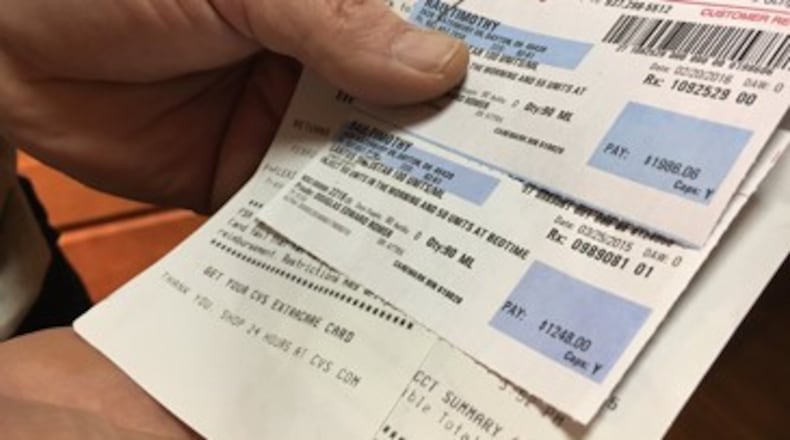The complaint claims Ohioans Against the Deceptive Rx Ballot Issue LLC, a corporation through which trade group PhRMA has contributed $15.8 million to the No on Issue 2 campaign, violated Ohio law by failing to register as a political action committee.
The LLC and the campaign are also accused of failing to disclose the full name and address of each individual donor.
ORIGINAL STORY:
The campaign to pass a prescription prices ballot issue in Ohio is accusing the opposition of breaking campaign finance laws and is considering filing a complaint with the Ohio Elections Commission.
On Monday, the “No on 2” political action committee Ohioans Against the Deceptive Rx Ballot Issue filed a disclosure statement showing it has received $15.8 million in donations, entirely from a subsidiary of the drug industry trade group Pharmaceutical Research and Manufacturers of America (PhRMA).
RELATED: Millions already spent on prescription drug price campaigns
The subsidiary is an limited liability corporation, formed in Ohio the same day as the PAC and bearing the same name.
The “Yes on Issue 2” campaign contends this was an illegal maneuver in order to avoid disclosing the individual donors of that money. They also say the LLC shouldn’t qualify for as a 501(C)(6) non-profit because its sole purpose is political.
“Our opponents are afraid and ashamed to show their faces because if the veil of secrecy were lifted what Ohioans would learn is that all the big name drug companies are financing the fight to defeat Issue 2,” said spokesman Dennis Willard.
The opposition campaign said they’ve never tried to hide where the money is coming from — big name drug companies.
“We’ve never made any secret of it. We’ve said that the pharmaceutical industry is funding the bulk of this campaign,” said spokesman Dale Butland.
MORE: Ohio Issue 2: What’s really going on?
The Secretary of State’s Office said campaign finance law does not address tax designations, such as 501(C)(6) status, but addresses what types of businesses may contribute. LLCs are allowed to contribute to ballot initiatives and there is no contribution limit.
But according to Ohio’s campaign finance handbook, LLCs are required to itemize contributions by each member or partner.
“A partnership or other unincorporated business may use its checking account to transmit a contribution, but the contribution must be accompanied by detailed information of each partner, owner or member and their allocated portion of the contribution. The recipient of such a contribution must itemize each allocated portion according to the information provided,” the handbook says.
Willard said it’s this lack of itemization that is intentionally shielding the names of the pharmaceutical companies making the contributions.
“The drug companies clearly don’t want to have their names associated — in black and white on public reports, available for all to see — with a campaign that is so obviously greedy, so self-interested, so hurtful to the best interests of Ohio families and taxpayers,” he said.
Butland said the LLC was the mechanism chosen by PhRMA in order to make the donation and the PAC doesn’t know the itemized breakdown of which companies donated how much.
“The member companies are publicly available and prominently displayed on the PhRMA website,” he said. “Not only have we complied with the law, but we have complied with every jot and tittle of the law.”
RELATED: Consumers kept in the dark over drug pricing
Although not illegal, donating through a non-profit without an itemized list of individual donors can be problematic and leave voters in the dark, said Catherine Turcer, Executive Director of Common Cause Ohio and an expert on Ohio campaign finance law. But in this case, the donors are easy to suss out, she said.
“Ohioans understand that it’s pharmaceutical companies that are opposed,” she said, because PhRMA’s name is on the donation and a list of that group’s members is available on its website.
The PhRMA website lists 37 members, including the largest pharmaceutical companies in the market — Johnson & Johnson, Pfizer, Merck, Gilead and more.
PhRMA spokeswoman Priscilla VanderVeer said no donations have come from any non-members and the company’s donations are in full compliance with Ohio campaign finance laws.
OHIO VOTES: Making sense of Issue 2
This November voters will decide on an effort to change how prescription drug prices in the state are regulated. Our team is going to keep you informed on this issue through Election Day.
About the Author
